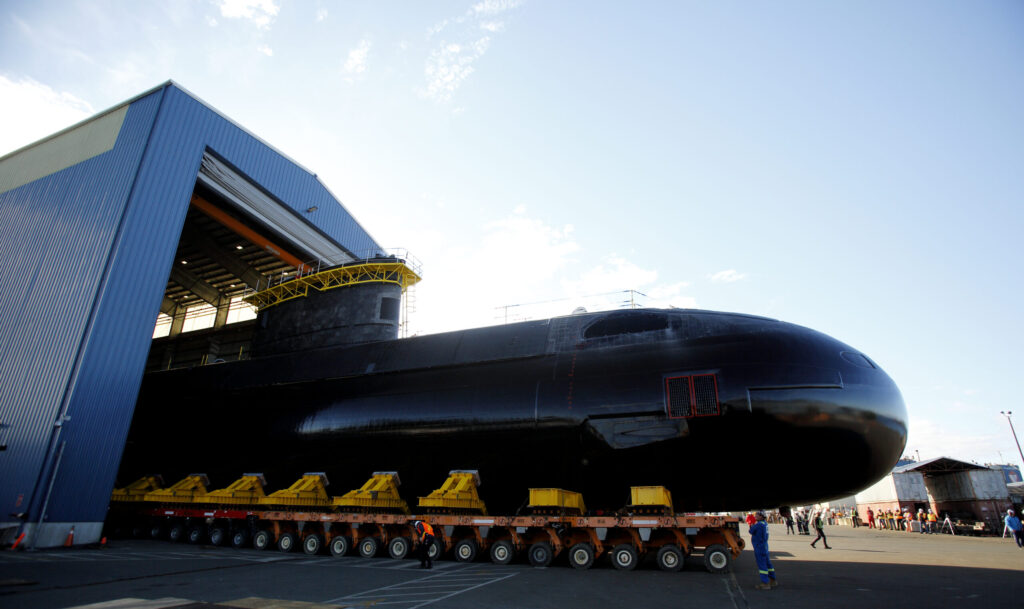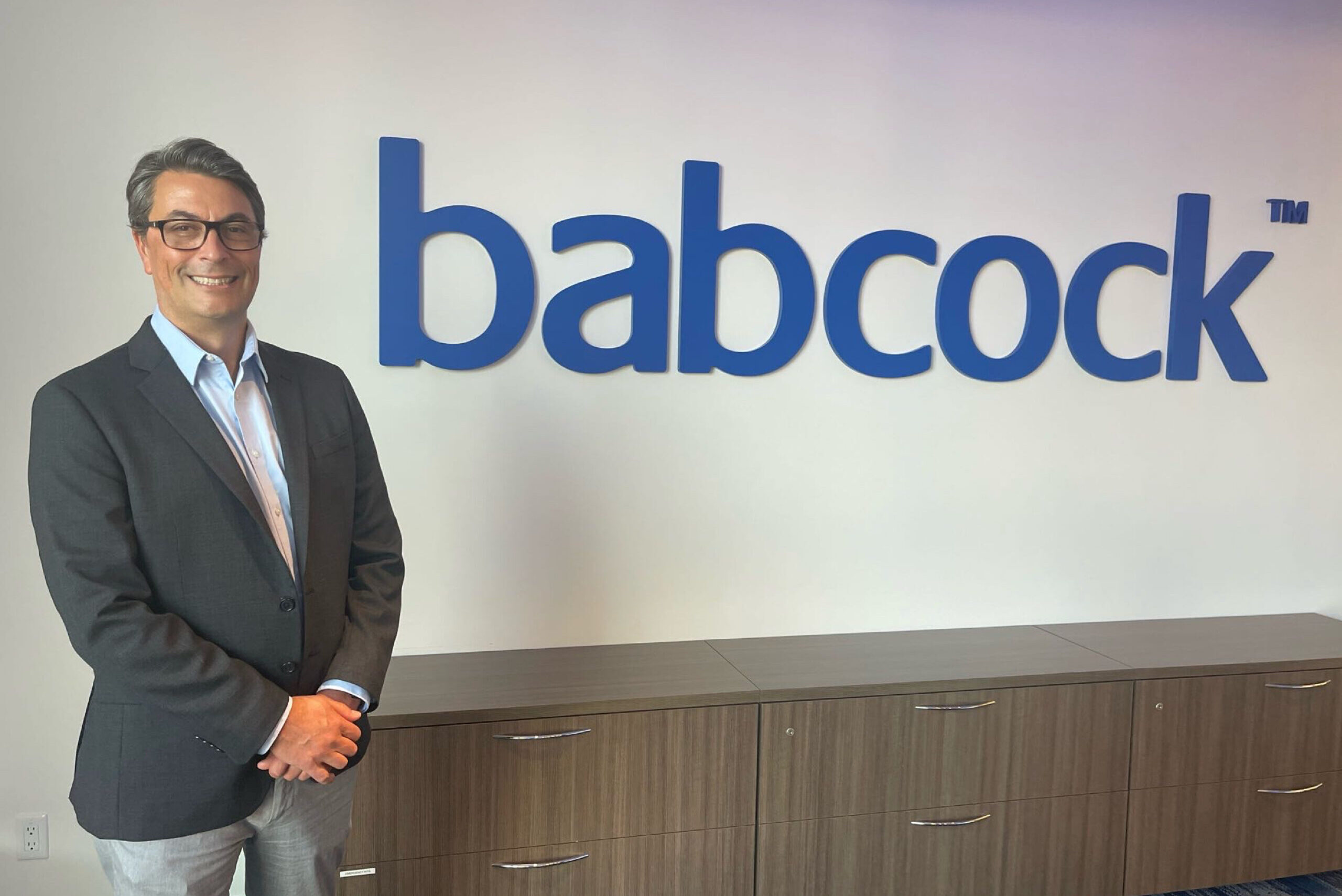Jason Young, Head of Waterfront Engineering, Babcock Canada, has been part of the Babcock team since 2013 and plays a key role as a leader on the Victoria In-Service Support Contract. The Victoria Class submarines are highly complex assets, something Jason is very aware of. We sat down with Jason to learn more about his role and how the complexities of the Victoria Class submarines have led him to work with highly talented teams on a diverse array of projects vital to the success of Canada’s fleet of submarines.
What path did you follow that ultimately led you to Babcock?
 I graduated from the University of Victoria with a degree in Mechanical Engineering. I then moved to Toronto, where I was fortunate to be hired into Ontario Power Generation’s (OPG) nuclear new graduate engineering program. At the time, this was a two-year program that was a mix of class-based work and four-month rotations working in various parts of the business. Ultimately, I worked in the Performance Engineering Department at the Pickering Nuclear facility, where I ended my OPG career holding the role of System Engineer. In this role I was responsible for the Shutdown of System Number Two, which was one of the two emergency reactor scram systems. I later moved back to Victoria in order to be closer to my family, following the birth of my son.
I graduated from the University of Victoria with a degree in Mechanical Engineering. I then moved to Toronto, where I was fortunate to be hired into Ontario Power Generation’s (OPG) nuclear new graduate engineering program. At the time, this was a two-year program that was a mix of class-based work and four-month rotations working in various parts of the business. Ultimately, I worked in the Performance Engineering Department at the Pickering Nuclear facility, where I ended my OPG career holding the role of System Engineer. In this role I was responsible for the Shutdown of System Number Two, which was one of the two emergency reactor scram systems. I later moved back to Victoria in order to be closer to my family, following the birth of my son.
What does being Head of Waterfront Engineering really mean?
As with any leadership role, being Head of Waterfront Engineering includes a myriad of duties. However, at its core, I see my role as having five key areas of focus: safety, technical quality, delivery, talent pool, and culture.
Safety:
First and foremost, everyone should go home safe every day. We work in an industrial environment which presents many different risks and therefore we must put safety at the forefront of everything we do. This is something I expect all managers to lead on and re-enforce.
Technical Quality:
The work we do in Waterfront Engineering, is both high integrity engineering and complex system testing that must be executed in a way that adds value into the projects we support. There is a strong link back to safety, but additionally the work we do must meet the exacting standards set out under our contracts and adhere to the demands of the various regulatory bodies. Submarine work is highly complex and therefore operates under a regulatory model very similar to that of both the nuclear and aviation sectors. As such the technical demands on the teams are high.
Delivery:
Waterfront engineering has a responsibility to deliver value for both our internal and external customers. In my role, I continually pursue ways of optimizing the work we do to increase the value we bring to the enterprise and meet the scheduled timeline laid out for us to complete various tasks.
Talent Pool:
The Waterfront Engineering team has the largest pool of Victoria Class Submarine technical expertise anywhere in the world outside of the Department of National Defece. For us to be successful going forward we need to maintain this workforce and continue to develop this talent pool. As such, my role is to work with the managers and ensure we have training and professional development plans to both grow the team and add to our value proposition. This allows Babcock to attract the best talent in the world.
Culture:
As the leader of the department, I must lead by example and ensure that everything I do, and the team does, aligns with Babcock’s Purpose and Principles: to be kind, to be curious, to be courageous, to collaborate, to think outcomes, and to own and deliver. The standard we walk by is the standard we set, and I take a lot of pride in the work we do every day to create a positive, safe, respectful, and inclusive culture. I want everyone to talk about this company and this team as a great place to work!
What inspires you in your work?
The teams I work with. We grow and attract Canada’s top technical experts in Victoria Class Submarine commissioning, surveying, and engineering. I can’t say enough about the professionalism and technical capacity that makes up the Waterfront Engineering team and wider delivery organization.
One of the greatest strengths in the Waterfront Engineering team is our collective technical expertise and therefore the team’s ability to adapt to the changing technical landscape of an Extended Docking Work Period (EDWP).
An EDWP is an intensive and complex multi-year work period where the boat undergoes extensive survey’s, repairs, and major capability upgrades. This period of the submarine life cycle is to ensure the boat remains safe, functional, and operationally capable for its return to the Royal Canadian Navy.
To the team’s great credit, they continually rise to the challenges they are confronted with and always provide high quality technical solutions to our program customers.

Jason Young, alongside members of his Waterfront Engineering Team, following the successful completion of a safety simulation earlier this year.
What has been a challenge you faced working on the submarine program and how did you and your team overcome it?

2021 Undocking of HMCS Corner Brook at the Esquimalt Graving Dock in Victoria, B.C.
The Royal Canadian Navy does incredible work with their platforms, and as you’d expect, this drives wear and tear. Similar to when you take a vehicle to the mechanic to make any necessary repairs, we perform the Hull Surveillance Requirement on the Victoria Class submarines to identify any necessary repairs or parts requiring replacement. This can result in work that needs to be done but was not necessarily scheduled.
For HMCS Victoria’s EDWP, the team has worked hard to find new ways of identifying necessary work early as well as innovative solutions to help address that work. Initiatives such as a Victoria Class surveyor training course, an optimized survey execution program, a Technical Review Committee, and improved collaboration between other companies with Canadian submarine expertise have all been implemented and are helping to position HMCS Victoria’s EDWP as an emerging success story.
I am very proud of the work the team has done on this project.
What makes you proud to be a part of Babcock and Team Victoria-Class?
There is never a dull day in submarines. As much as we have in-depth strategic plans, an integrated master schedule, and codes and standards to follow, every day presents unexpected challenges, and it is really engaging working with the engineering and commissioning teams on these issues.
I am also very proud to be part of an organization that takes such good care of its people. I have seen countless examples of Babcock stepping up and supporting its employees and I have a lot of respect for the positive changes our executive leadership team has put in place. These changes will enable us to deliver a better product for our customers.
What is something your colleagues may not know about you?
It’s not something I advertise widely, but I am a big football (soccer for the Canadians) fan and had the opportunity to go to the World Cup in Qatar last year. I got to knock two things off my bucket list in one go. I had never been to the Middle East before and it was an amazing experience because I got to see the Canadian powerhouse score a goal at World Cup, which was a historical first!

Photo captured by Jason at the 2022 World Cup.






